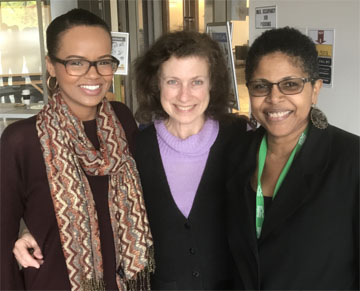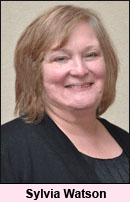OPINION
Shoreline faculty leads the way with ‘Day of Resistance’
By SYLVIA WATSON
SHORELINE (May 8, 2017) — We all saw, and maybe even participated in, the recent May Day Rally and March in honor of workers’ and immigrants’ rights. In this time of uncertainty, executive orders, and rollbacks on everything from children’s school lunches to travel to health care to the environment, many are feeling the need to resist the direction this country is headed.
While the marches and rallies took place, Shoreline Community College decided to organize informational events and trainings on May 1st and 2nd. After all, they are all about education!
This event, called “Day of Resistance,” was jointly sponsored by the college administration, the Student Leadership Center, and the faculty union local, Shoreline Community College Federation of Teachers Local 1950. Union members who were instrumental in organizing this event are Local 1950 president DuValle Daniel, local boardmember Nancy Eichner, and faculty members Caroline Conley and Abby Forster.

From left, Nimco Bulale of OneAmerica, Local 1950 executive board member Nancy Eichner, and Local 1950 President DuValle Daniel. (Photo by Richard Burton)
Faculty, staff, students, and community members attended workshops throughout the day.
Two workshops were held: a workshop on workers’ rights and Right-to-Work-for-Less by Kelly Coogan-Gehr, Director of the Washington State Labor Education and Research Center, and a workshop on climate change and the effects of the current administration’s policies by Judy Twedt, a UAW Local 412 member and a representative on the M.L. King County Labor Council’s climate caucus.
Do you know that since Donald Trump was elected, Institute for Research and Education on Human Rights (IREHR) has reported a 600 percent increase nationwide in racially motivated incidents?
Devin Burghart, vice president of IREHR, spoke to this issue along with Dr. Christopher Parker, a published author and political science professor from the University of Washington. Dr. Parker explained the dynamics of race and racism and how events, such as the Trump election, historically follow a consistent pattern in which racial progress toward equity is followed by racial retrenchment. He highlighted the Tea Party movement during the Obama administration as an example.
A panel presentation on practical application on the right to free speech and expression on a college campus was conducted by the ACLU, Anti-Defamation League, Council on American-Islamic Relations (CAIR), IREHR, Professor Parker, and the King County Prosecutor’s Office.
So what is free speech? When does it cross the line? There are a lot of factors that define what is considered expression of free speech vs. violating rights of an individual. For example, one attendee asked about someone on campus who wears Hammerskin clothing and whether or not they should be banned from campus. The Hammerskin Nation is a neo-Nazi white supremacy group based in the Pacific Northwest. The answer was that, as with most situations involving free speech, the context matters.
The day ended with training on how to conduct civil disobedience by Jen Haggard, an internal organizer with AFT Washington. She talked about the importance of thorough planning for successful direct action and civil disobedience. Workshop participants practiced holding their ground in the face of verbal assault and working together to peacefully move a violent person away from other people.
The next day, May 2nd, OneAmerica gave a training on knowing what you should or shouldn’t do if confronted by law enforcement whether you are a student, college employee, or documented or undocumented immigrant.
The days leading up to the May Day of Resistance event were a bit nerve-wracking. A couple of “unfriendly” phone calls were received, and Campus Reform, a website of the conservative Leadership Institute, ran an article that criticized the union for asking their members to provide ways their students could participate.
Despite these incidents, the event was well-received, well-attended, peaceful, and educational.
 Sylvia Watson is Communications Coordinator for AFT Washington, AFL-CIO.
Sylvia Watson is Communications Coordinator for AFT Washington, AFL-CIO.





